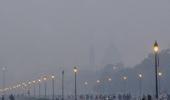Alarmed by hazardous pollution levels and health warnings, the Delhi government on Friday announced that primary schools will remain shut from Saturday and 50 per cent of its staff will work from home, while private offices have been advised to follow suit.

Delhi's air quality remained "severe" for a second day on the trot, with stubble burning accounting for 30 per cent of the PM2.5 pollution in the capital, according to the Central Pollution Control Board and SAFAR, a forecasting agency under the Ministry of Earth and Sciences.
Over the last few days, the Bharatiya Janata Party and the Aam Aadmi Party have traded barbs over the increase in stubble burning in Punjab.
However, on Friday, Delhi Chief Minister Arvind Kejriwal and his Punjab counterpart Bhagwant Mann owned responsibility for paddy straw burning in the agrarian state and promised to curb the practice by next winter.
"We (AAP) have our government in Punjab and we are responsible if 'parali' is being burnt there. Farmers are not responsible for it," Kejriwal said in a joint press conference with Mann.
Union Agriculture Minister Narendra Singh Tomar said stubble burning is not a "political issue" but expressed concern over rising farm fires despite funding and machines provided by the Centre.
The number of stubble burning incidents in Punjab rose 12.59 per cent year-on-year to 26,583 in the last 50 days, with a spurt in such cases after Diwali, according to the latest Indian Council of Agricultural Research (ICAR) data.
However, when compared to Punjab, the number of paddy stubble burning events in Haryana, Uttar Pradesh, Rajasthan, Madhya Pradesh and Delhi remained lower between September 15 and November 4 this year, the data showed.
The Supreme Court agreed to list for hearing on November 10 a public interest litigation seeking fresh guidelines on stubble burning.
Taking note of the hazardous air quality, the National Human Rights Commission asked the chief secretaries of Punjab, Haryana, Uttar Pradesh and Delhi to appear before it on November 10 to discuss the matter, an official statement said.
The commission said it was "not satisfied" with the action taken so far to address the issue and that "much more" needs to be done to reduce pollution in Delhi.
While parents breathed a sigh of relief following announcement to shut primary schools, academicians expressed concern over learning losses due to the frequent suspension of classes -- earlier in view of the Covid pandemic and now because of deteriorating air quality.
Experts suggested that the government should rejig vacation schedule as pollution turns severe every winter.
At a press conference, Delhi Environment Minister Gopal Rai said schools would be asked to curtail outdoor activities of senior students.
Rai ordered 50 per cent of the staff of the Delhi government to work from home, and said an advisory would be issued to private offices to follow suit.
He said the Delhi government has decided to implement the anti-pollution curbs recommended by the Commission for Air Quality Management (CAQM), including a ban on non-BS VI diesel-run light motor vehicles.
A six-member panel chaired by the special commissioner of transport has been set up to monitor the implementation of curbs on anti-polluting activities. Revenue commissioners have been asked to prepare a plan for staggered timings of markets and offices.
In a bid to ramp up public transport, the government will also launch 'Paryavaran Bus Service' which will include 500 privately-run CNG buses.
Kejriwal said the odd-even car rationing scheme will be implemented if need arises and discussions on it are on.
According to a study conducted by The Energy and Resources Institute in 2018, vehicular emissions account for around 40 per cent of the PM 2.5 pollution in the capital.
The 24-hour average air quality index (AQI) of Delhi stood at 447 at 2 pm.
It had jumped to 450, just a notch short of the 'severe plus' category, on Thursday, prompting the authorities to invoke the final stage of anti-pollution curbs under GRAP -- a set of anti-pollution measures followed in Delhi and its surrounding towns according to the severity of the situation.
An AQI of above 400 is considered "severe" which can affect healthy people and seriously impact those with existing illnesses.
Almost all air quality monitoring stations reported "severe" air quality, while 13 of them logged an AQI of more than 450.
The data from the Delhi Pollution Control Committee (DPCC) showed that the concentration of lung-damaging fine particles known as PM2.5 was above 600 micrograms per cubic metre, around eight times the national standard of 60 micrograms per cubic metre, in many areas.
According to the World Health Organization, a 24-hour average PM2.5 concentration of up to 15 microgram per cubic metre is considered safe.
According to the Energy Policy Institute at the University of Chicago's Air Quality Life Index (AQLI) released in June, the residents of Delhi stand to lose 10 years of life expectancy due to poor air quality.
An analysis conducted by the DPCC in 2021 showed people in the capital breathe the worst air between November 1 and November 15 when stubble burning peaks.











 © 2025
© 2025